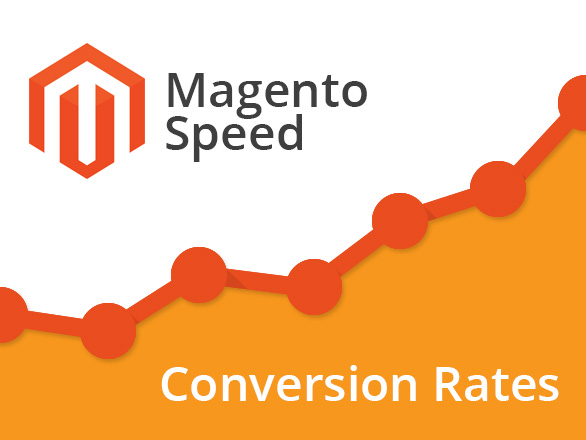How Magento Speed Influences Conversion Rates?
Today’s post is aimed to show you why Magento speed matters when it comes to conversion rates.
For every ecommerce business owner his site is what he invests in, works on and, naturally believes in. Either having a hired site support team, or trying to run the site by himself, every online business owner is trying to do his best to attract crowds of visitors and expects them to become loyal customers. To achieve this aim, every single means is used: sophisticated design, fresh content and beautiful images, smart navigation and contact forms, but there is one thing that can spoil everything – if your Magento site is slow, you are very likely to lose your customers in no time. You should solve this problem as soon as possible and speed up Magento to make your online store competitive. Below you will find how Magento speed influences conversion rates and the reasons why you should make Magento performance optimization your key priority:
1. Google Sets the Rules.
Back in 2010 Google announced that slow website performance would influence Search Ranking. Moreover, in 2013 the same rule was established for mobile websites. The calculation is simple – if your Magento store is slow, your website is going to be at the bottom of search ranking list, and few, if any, users are going to visit it at all: slow Magento=little visitors=zero conversion.
2. The Human Factor.
People do not want to wait. You can keep moaning and groaning about users’ inability to concentrate and just wait a second for your awesome site to load, but the bitter truth is that they will not waste their time for observing the ‘Loading…’ sign on the screen. They will just find a different online merchant to buy from. Want some facts? Here you are:
- In 2009, Forrester Research revealed that 47% of all customers expect a webpage to load in two seconds or even less.
- In a research by Aberdeen Group, Aberdeen found that 25% of users will leave a web application after just 3 seconds of delay.
- A similar study conducted by Akamai found that 57% of visitors will abandon a travel website after waiting 4 seconds for a page to load.
- 52% of online buyers admit that quick page loads are important for their loyalty to a website.
- 64% of online shoppers who are dissatisfied with their site speed will find a different place to shop next time.
- 23% will even stop shopping or walk away from their computers. It was also discovered that only 3 out of 10 shopping carts made it through the checkout process meaning that 7 out of 10 shopping cart were abandoned at the checkout.
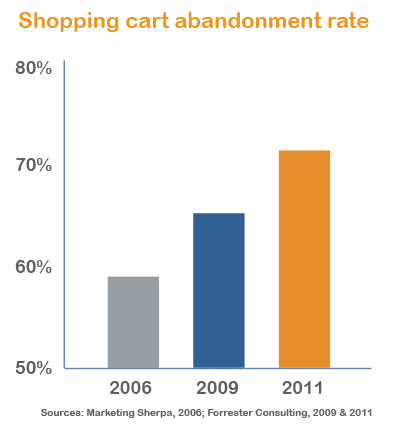
3. Slow Magento store Reduces Sales.
If people do not want to wait for the page to load, they will not buy anything from you.
- Research by Amazon had it that every 100 millisecond delay in page loading time cut their sales by 1%.
- Google and Microsoft Bing’s study also proved the negative effect of slow websites, stating that each 2 second delay in page load time decreased ad revenues by 4.3%.
- The scheme below shows you the results of the test made by Walmart. It illustrates that if a site takes more than 4 seconds to load there is a great decline in conversion rates.
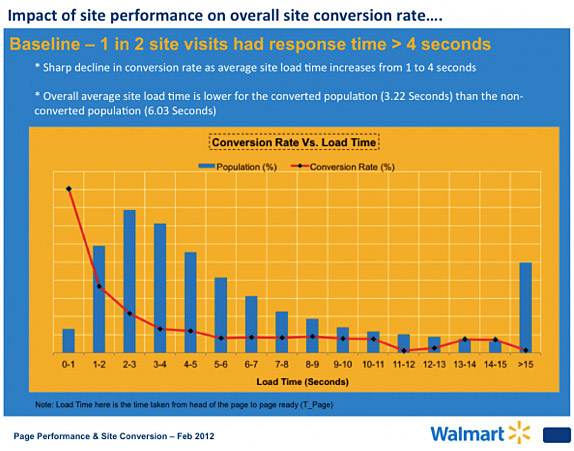 It is interesting to see that a research conducted by Tagman showed that every second of delay in page loading time can result in a 7% decrease of online sales. Making a short case study they calculated the lost revenue for each additional second a site takes to load. The result was that for a website having average ticket size $75 and conversion rate 5%, for every 400,000 unique visits each month, there would be a loss of $1.3m in revenue per year.
It is interesting to see that a research conducted by Tagman showed that every second of delay in page loading time can result in a 7% decrease of online sales. Making a short case study they calculated the lost revenue for each additional second a site takes to load. The result was that for a website having average ticket size $75 and conversion rate 5%, for every 400,000 unique visits each month, there would be a loss of $1.3m in revenue per year.
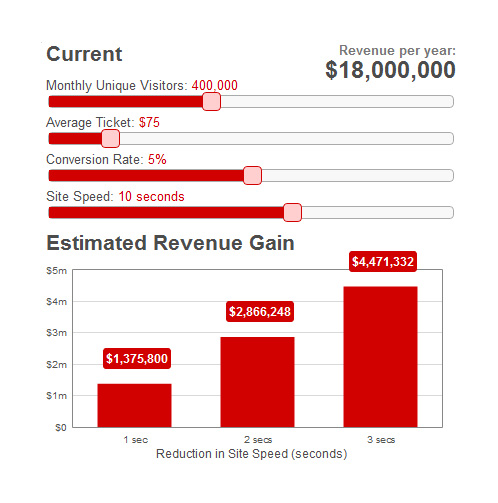
The latest data on page value come from the analysis of 94 million page views across 16 e-commerce sites. The research shows that going from 8 to 5 seconds is easy to achieve and generates an 18% value/page view increase.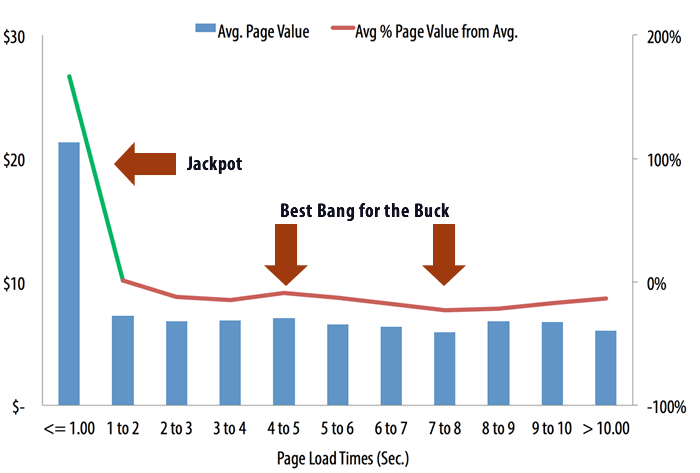
4. Being Fast is Crucial Today.
The leading e-commerce sites have realized that increasing Magento speed is the key to success nowadays. They improved their sites’ speed to meet this requirement. Have a look at the stats resulted from the practices implemented by the giants in e-commerce:
- For every 1 second of improvement Walmart observed up to a 2% increase in conversions, while for every 100 ms of improvement, the company grew incremental revenue by up to 1%.
- Shopzilla sped up average page load time from 6 seconds to 1.2 seconds, and thus increased page views by 25% and revenue by 12%.
- Yahoo also took the advantage of speeding their site and boosted traffic by 9% for every 400ms of improvement.
- Finally, Mozilla made their pages 2.2 seconds faster and got 60 million more Firefox downloads per year, as a result.
As you can see, your site should load no longer than 2-4 seconds to be able to compete. Research has it that 79% of online-shoppers who are dissatisfied with website performance are less likely to return to the same site again, meaning a great loss for any Magento site owner.
So, with this all in mind, what should you start your Magento speed optimization with?
You might be interested to know how you can speed up your site. The first thing you should do is to perform a Magento speed test. There are several proven tools to do it.
- Web Page Test
- Google Page Speed
- Siege Tool
- Firebug or Chrome Developer Tool
- Mage Speed Test
- Yahoo Yslow
Then, you will have to eliminate all the factors that can possibly slow down your store. As a rule, most problems are hidden behind slow magento cache, mysql performance tuning, unoptimized images and issues loading static content. Check our blog article on magento speed optimization tricks or this magento performance optimization service from Plumrocket if you don’t feel like optimizing webhosting and magento code yourself.
Once you decided to save your e-commerce business from being dismissed by your clients as slow and inefficient, be sure to optimize your mobile site too. (And don’t even tell us that you don’t have a mobile version of your e-commerce site!)
The stats also show that:
- 57% have experienced problems when visiting a mobile site.
- 46% would not return to a mobile site showing poor performance
- 74% of users will abandon after waiting 5 seconds for a mobile site to load.
The infographics below shows that customers expect the same speed from mobile ecommerce as they get from desktop experience.
As you can see, the first thing an online business owner should do is to speed up magento store to get higher conversion rates. Due to improving Magento performance, your visitors are more likely to click on your ads and become loyal customers.

